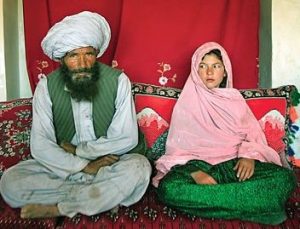By Asha Allamby

Soon to be wed Faiz Mohammed, 40, and Ghulam Haider 11, Ghowr Province, Afghanistan. (Photo by Stephanie Sinclair)
Beaten, molested, and imprisoned. These are just a few of the consequences that are all too familiar among child brides in Afghanistan. The majority of these girls have been married off before they are legally able to do so, as was the case with Ghulam Haider pictured above. The combination of poverty and limited education are just a few factors driving the high rates of child marriage in Afghanistan.
Child marriages continue to thrive in developing countries in the African and Southeast Asian regions of the world. Despite efforts from Afghanistan’s government to establish a legal age at which girls can marry, the tradition of child marriages continues to flourish. A girl may be married off young due to costs of bride price, dowry or to settle a blood feud. After decades of war, many Afghanistan families find themselves severely impoverished and feel that their daughters are a financial burden. They may choose to marry them off young to receive a bride price or to pay a low dowry to the groom and his family. Some families cannot afford a dowry so they exchange young female members of the family in an act known as badal. Lastly, when girls are given to other families to settle a dispute, the act is known as baad. This is considered one of the most abusive customs towards young girls. In- laws take out anger on the young bride because she is a constant reminder of a family member they lost.
One of the major hurdles in tackling child marriage in Afghanistan is attempting to close the loopholes around the age for which a child can marry. The laws currently allow a girl to get married as young as 15 with parental consent. Even so, how is it possible most girls get married before the age of 15?
Afghanistan is considered an Islamic state meaning it the government is influenced by Islam. In the Quran, Islam’s religious text, a child is suitable to marry after her first menstruation. The problem arises when a girl as young as 9 has her first menstruation. She is then considered old enough to marry, even to someone old enough to be her father.
Unfortunately, data on child brides can sometimes be hard to retrieve as marriages do not have to be registered to the state in Afghanistan. Nevertheless, 40 percent of girls are married between the ages of 10 and 14. In extreme cases, they were married to someone 50 years older. Once married, child brides often become victims of domestic violence from their spouses and in-laws. They are beaten, raped, neglected and subjected to servitude. If they run away, they may be subjected to imprisonment. Each year 2,400 women turn to self- immolation to escape their abusive husbands. Child brides have profound impacts on their health physically, sexually and psychologically. Child marriage is a clear violation of human rights.
Because Afghanistan is a patriarchal society, men dominate every aspect of women’s lives. This results in child brides not being able to finish their educations. They are cut out of the public sphere and socializing with people their own age. Men, whether their husbands, brothers, or fathers, determine if a child will receive adequate health care during the time of child birth. A girl’s lack of access to health care is particularly alarming during child birth because she is five times more likely to die if she gives birth before she is 15 years old. Child marriages and reduced access to health services has a direct link to the child being malnourished or premature.
One solution to ending the child bride epidemic would be to identify where girls are more at risk of being forced in child marriages so that prevention programs could be started. Additionally, it is imperative that Afghanistan’s government and religious leaders condemn the practice. Child marriage is also continuing to be a viewed as a women’s issue, deterring men from stopping the practice. Men and women alike must be educated about the harm of child marriages. There are currently two organizations dedicated to fighting against forced child marriage. One is Save Your Rights (http://www.saveyourrights.org ), which works internationally, and Women for Afghan Women (http://www.womenforafghanwomen.org), which works on a broad agenda of women’s rights within Afghanistan. Check them out if you want to get involved.
Asha Allamby is a graduating senior at East Carolina University with a major in International Studies and a minor in Ethnic Studies and Sociology. She intends to get her MS in Social Work so she can further assist disadvantaged minority populations in the U.S and abroad